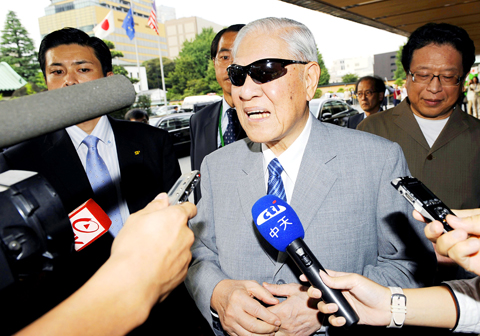Former president Lee Teng-hui (李登輝) arrived in Japan yesterday for a week-long stay.
The visit is the fifth by Japan-educated Lee, 86, since he stepped down as president nine years ago. During his 1988 to 2000 term, he nurtured democracy and tried to promote a separate identity for Taiwan.
Each of Lee’s Japan trips has triggered protests from China, which sees them as attempts to strengthen Taiwan’s status, although the complaints have grown less vehement.

PHOTO: AP/KYODO NEWS
Japan does not require visas for Taiwanese tourists and Lee has said the visit is private.
Lee, wearing a grey suit, arrived at Narita Airport near Tokyo accompanied by his wife and was heavily guarded by security officers.
He was greeted by a small group of supporters waving the flags of Japan and Taiwan.
Lee plans to deliver a speech in Tokyo on Japanese society today. He is then scheduled to fly to Kochi and Kumamoto in southern Japan to deepen ties with business groups before heading back to Taiwan on Thursday.
On a visit to Japan last year, Lee said that an island group disputed between Japan, Taiwan and China was “a territory of Japan.”
The archipelago in the East China Sea is known in Japan as the Senkaku Islands and as the Diaoyutai (釣魚台) Islands in Taiwan.
“The land of the Senkaku Islands belongs to Okinawa, therefore it is a territory of Japan,” Lee said in an interview carried in the Okinawa Times in southern Japan.
During a visit in 2007, Lee mourned his late brother at Tokyo’s controversial Yasukuni war shrine.
The Shinto shrine venerates those who died in wars while fighting for Japan, including convicted war criminals from World War II.
Lee’s elder brother is enshrined at Yasukuni because he died serving in the Japanese navy in the Philippines in February 1945 when Taiwan was a Japanese colony.

The brilliant blue waters, thick foliage and bucolic atmosphere on this seemingly idyllic archipelago deep in the Pacific Ocean belie the key role it now plays in a titanic geopolitical struggle. Palau is again on the front line as China, and the US and its allies prepare their forces in an intensifying contest for control over the Asia-Pacific region. The democratic nation of just 17,000 people hosts US-controlled airstrips and soon-to-be-completed radar installations that the US military describes as “critical” to monitoring vast swathes of water and airspace. It is also a key piece of the second island chain, a string of

A magnitude 5.9 earthquake that struck about 33km off the coast of Hualien City was the "main shock" in a series of quakes in the area, with aftershocks expected over the next three days, the Central Weather Administration (CWA) said yesterday. Prior to the magnitude 5.9 quake shaking most of Taiwan at 6:53pm yesterday, six other earthquakes stronger than a magnitude of 4, starting with a magnitude 5.5 quake at 6:09pm, occurred in the area. CWA Seismological Center Director Wu Chien-fu (吳健富) confirmed that the quakes were all part of the same series and that the magnitude 5.5 temblor was

Taiwan will now have four additional national holidays after the Legislative Yuan passed an amendment today, which also made Labor Day a national holiday for all sectors. The Chinese Nationalist Party (KMT) and Taiwan People’s Party (TPP) used their majority in the Legislative Yuan to pass the amendment to the Act on Implementing Memorial Days and State Holidays (紀念日及節日實施辦法), which the parties jointly proposed, in its third and final reading today. The legislature passed the bill to amend the act, which is currently enforced administratively, raising it to the legal level. The new legislation recognizes Confucius’ birthday on Sept. 28, the

The Central Weather Administration has issued a heat alert for southeastern Taiwan, warning of temperatures as high as 36°C today, while alerting some coastal areas of strong winds later in the day. Kaohsiung’s Neimen District (內門) and Pingtung County’s Neipu Township (內埔) are under an orange heat alert, which warns of temperatures as high as 36°C for three consecutive days, the CWA said, citing southwest winds. The heat would also extend to Tainan’s Nansi (楠西) and Yujing (玉井) districts, as well as Pingtung’s Gaoshu (高樹), Yanpu (鹽埔) and Majia (瑪家) townships, it said, forecasting highs of up to 36°C in those areas